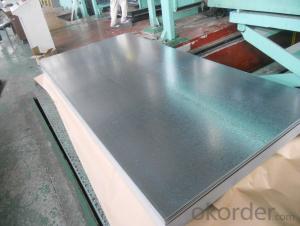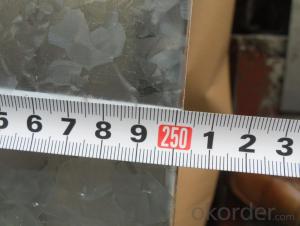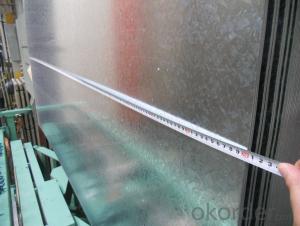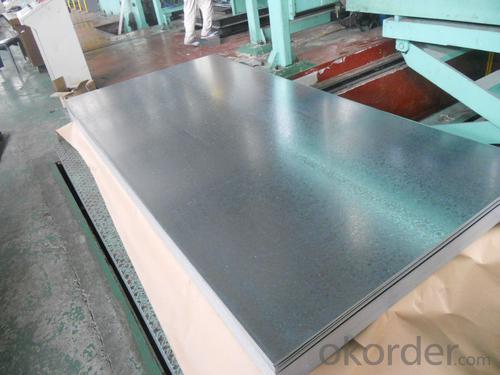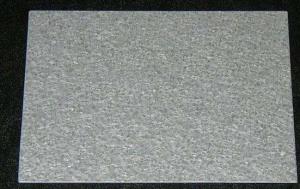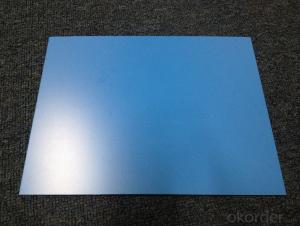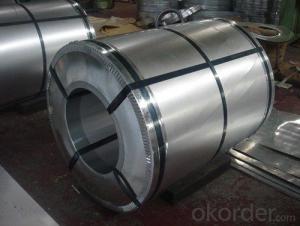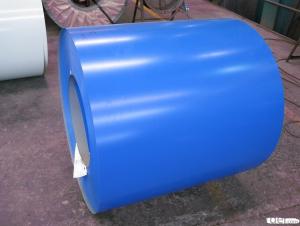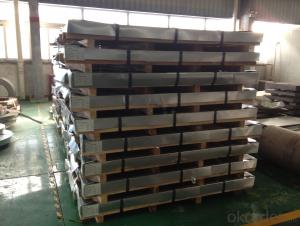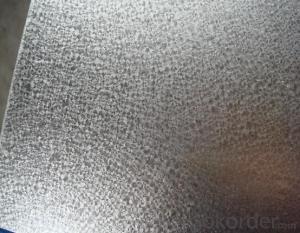Hot-Dip Aluzinc Steel Sheet
- Loading Port:
- China Main Port
- Payment Terms:
- TT OR LC
- Min Order Qty:
- -
- Supply Capability:
- -
OKorder Service Pledge
Quality Product, Order Online Tracking, Timely Delivery
OKorder Financial Service
Credit Rating, Credit Services, Credit Purchasing
You Might Also Like
Aluzinc Steel Sheet
Steel Grade & Standard:G550
Spangle:Minimized Spangle
Aluzinc Coating Mass:AZ40
Surface Treatment:Chromated, Unoiled, NonSkinpassed, Anti-Finger Print
Size: 0.25mm x 914mm x 2448
Package Type:EYE TO SIDE
Thickness Tolerance:+/-0.01mm
Width Tolerance:0/+5mm
Quantity Tolerance: +/-10mts
- Q: Can steel sheets be used for fencing applications?
- Yes, steel sheets can be used for fencing applications. Steel sheets are commonly used for fencing due to their durability, strength, and resistance to harsh weather conditions. They provide a sturdy and secure barrier, making them suitable for various fencing applications such as residential, commercial, industrial, and agricultural purposes.
- Q: Are steel sheets magnetic?
- Yes, steel sheets are magnetic.
- Q: How can steel sheets be protected from corrosion?
- Steel sheets can be protected from corrosion through various methods such as applying protective coatings like paint or galvanization, implementing cathodic protection techniques, using corrosion inhibitors, or ensuring proper maintenance and regular inspection to identify and address any potential corrosion issues promptly.
- Q: How do steel sheets handle weathering?
- Steel sheets handle weathering by forming a protective oxide layer on their surface when exposed to air and moisture. This oxide layer, known as patina, acts as a barrier against further corrosion, making steel sheets highly resistant to weathering effects such as rusting and degradation.
- Q: Are the steel sheets corrosion-resistant?
- Depending on the steel type and the applied protective coating, steel sheets can exhibit corrosion resistance. Stainless steel sheets, for instance, possess outstanding corrosion resistance due to the presence of chromium, forming a passive protective layer on the surface. Furthermore, galvanized steel sheets are coated with zinc, serving as a sacrificial barrier to safeguard the underlying steel against corrosion. Coatings like painting, powder coating, or plating can also render other types of steel sheets corrosion-resistant. Thus, it becomes crucial to consider the specific steel type and any additional protective measures implemented in order to assess the corrosion resistance of steel sheets.
- Q: What are the uses of steel sheets?
- Steel sheets have a wide range of uses across various industries and applications. They are commonly utilized in construction for roofing, siding, and structural components. Steel sheets are also used in automotive manufacturing for body panels, chassis, and engine parts. Additionally, they find applications in the manufacturing of appliances, furniture, storage tanks, and machinery. The versatility, durability, and strength of steel sheets make them an essential material in many sectors.
- Q: What is the weight of steel sheets?
- The weight of steel sheets can vary depending on the thickness and dimensions of the sheet. Generally, steel sheets can range from a few pounds to several hundred pounds per square foot.
- Q: How many times a day can a steel pile be inserted?
- Steel sheet pile U type and Z type and AS type, the Z type and AS type steel sheet pile production, processing and installation is more complex, and the price is U higher than about 1/3, mainly used in Europe and the United States, Japan and South Korea and other Asian countries, mainly the use of U type steel sheet pile.
- Q: How do you remove stains or marks from steel sheets?
- To remove stains or marks from steel sheets, you can start by wiping the surface with a clean cloth soaked in warm soapy water. For tougher stains, you can try using a mild abrasive cleaner or a mixture of baking soda and water to gently scrub the affected area. If the stain persists, you can use a non-abrasive stainless steel cleaner or vinegar to further remove the marks. Remember to rinse the steel sheet thoroughly and dry it properly to prevent any water spots or residue.
- Q: Can steel sheets be welded?
- Yes, steel sheets can be welded.
Send your message to us
Hot-Dip Aluzinc Steel Sheet
- Loading Port:
- China Main Port
- Payment Terms:
- TT OR LC
- Min Order Qty:
- -
- Supply Capability:
- -
OKorder Service Pledge
Quality Product, Order Online Tracking, Timely Delivery
OKorder Financial Service
Credit Rating, Credit Services, Credit Purchasing
Similar products
Hot products
Hot Searches
Related keywords
